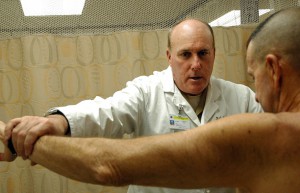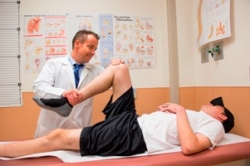Shoulder pain has a way of creeping into nearly every part of daily life. Simple movements — like reaching into a cabinet, fastening a seatbelt, getting dressed, or even finding a comfortable sleeping position — can suddenly become frustrating or downright painful....
Sleep plays a vital role in healing, recovery, and overall well-being. Unfortunately, hip pain can make getting a full night’s rest feel nearly impossible. Tossing and turning to find a comfortable position, waking up from sharp or aching pain, or starting the morning...
If you are struggling with lower back pain that radiates down your leg, you might have hit the internet searching for answers, only to find the terms “sciatica” and “herniated disc” discussed frequently. This is because both conditions can cause debilitating back...
Finding the Right Orthopaedic Doctor

Our bones take a lot of wear and tear over time and the need for a good orthopaedic doctor is necessary in nearly everyone’s life at some point. Seeing that this is a specialty, it can be confusing to know how to go about finding the right doctor for you and your situation. Let’s try to make this less stressful.
Where To Start
- Your family doctor – Physicians, regardless of specialty, tend to know who does what work and what kind of reputation they have. Your family doctor will be able to give you a suggestion or two.
- Family and friends – If you have friends or family members who have had to consult with an orthopaedic doctor, ask them about their opinion of the doctor they saw. Find out if they would willingly send someone to that doctor.
- Orthopaedic patients – While it isn’t easy to know who is actually seeing an orthopaedic doctor, some patients are obvious with casts or you overhear a conversation. Don’t hesitate to ask who their doctor is and if they are happy with that doctor.
Before Making an Appointment
By now you should have a short list of several possible doctors to consider. Before making an appointment, there are some things you can do to help you narrow down that list.
- Contact the American Academy of Orthopaedic Surgeons and check on the credentials of the doctors you are considering.
- Do some research into what may possibly be causing your problem and find out the different methods of treatment that are available.
- Contact your insurance to make sure orthopaedic services are covered, which ones are covered and what doctors on your list accept that particular insurance.
- Check on the training and board certification of the doctors you are considering.
First Appointment
You’ve decided on a doctor you think might be good for you and your orthopaedic problem. There are some things to look for during your first appointment that will help you decide if this is the one or if you should keep looking.
- Does the doctor listen to you as you explain your problem? You want a doctor that is willing to take the time to get to know the details of your particular problem, not just a general idea.
- Is the doctor willing to answer any questions you have? This is your first experience with an orthopaedic doctor and a good one will willingly answer any questions about what to expect and will understand you may be nervous and need things clarified.
- Does the doctor explain things in simple terms, yet not treat you like a child or act like you are bothering them? This is your body and you deserve to know exactly why and how things are going to be done.
Do you feel comfortable with the doctor and trust them? Trust your instinct here. A good doctor-patient relationship needs to be based on trust. The stress that comes from not being comfortable with the orthopaedic doctor could make healing and recovery more difficult. Having done research in advance of your appointment, however, should make it easier to have confidence in your choice.


